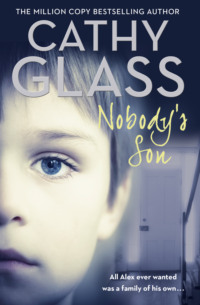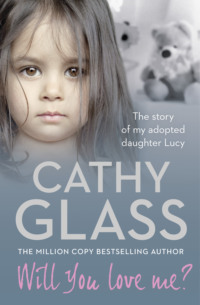
Полная версия
Finding Stevie: A teenager in crisis
‘At least Stevie returned home. Does he run off like that often?’
‘He has been doing recently,’ she said, and was about to add more when her mobile phone started ringing. ‘Sorry, I need to take this call.’ She stood and left the room.
I was left gazing around and twiddling my pen as her muted voice floated in from outside. A few minutes later it stopped and the door opened. Verity came in followed by an elderly couple and a young lad I took to be Stevie. Tall for his age, slim, with styled blond hair flopping over his forehead, he was clearly dressed to impress. Straight-legged, pink-sheen jeans, with a white jersey under a zip-up black leather jacket. I stood and went over to greet them.
‘This is the foster carer, Cathy Glass,’ Verity said, introducing me.
Stevie threw me a small nod and rearranged his fringe, while his grandmother said hello and his grandfather shook my hand. First meetings between the child’s family and the foster carer are always a little difficult and I sensed their reservations. Although I had the best intentions, I was, after all, usurping their role by looking after their grandchild.
‘Mr and Mrs Jones,’ Verity added.
‘Peggy and Fred,’ his grandfather said, and I smiled.
We settled around the table. Verity moved to the end so the three of them could sit together, opposite me, but Stevie sat at the far end of the table, putting as much space as possible between him and his grandparents. Despite this and his flamboyant clothes suggesting confidence, I could see he was nervous. ‘It’s good to meet you,’ I said to him.
He gave a small smile and flicked back his fringe. I saw then he was wearing eye make-up – not a lot, just mascara and eyeliner.
‘So,’ Verity began, ‘this is a short meeting to give us a chance to get to know each other. I’ll make a few notes as we go, but I won’t produce minutes. Let’s start by introducing ourselves.’ Fred sighed, but all social services meetings start with the formality of introductions, even if those present know each other. ‘I’m Verity Meldrew, Stevie’s social worker,’ she said, then looked to Peggy sitting on her left.
‘I’m Peggy Jones, Steven’s grandma, and I apologise for the state he’s in. I told him to change his clothes and take off that make-up, but he refused.’ Stevie responded with a dismissive, overstated shrug.
‘Cheeky bugger!’ his grandfather fumed. It was instantly clear how easily Stevie could wind up his grandparents.
Verity threw me a glance, then said, ‘Let’s continue with the introductions. Mr Jones, you’re next.’
He huffed and said, ‘Fred Jones. And unlike my wife I’m not apologising for the state of him. We brought him up proper, as best we could, and at our age it hasn’t been easy.’
‘Thank you,’ Verity said, then looked to Stevie to introduce himself. My heart went out to him; although it was his choice to sit at the far end of the table, he now looked very alone. I felt I wanted to reach out and give him a hug, as big as he was.
‘Stevie Jones,’ he said, emphasising ‘Stevie’ as he wanted to be known, rather than Steven as his grandmother had called him. ‘It’s not my fault. They won’t accept me for who I am.’
Verity smiled at him reassuringly and then looked to me to introduce myself.
‘Cathy Glass, foster carer,’ I said.
‘Thank you,’ Verity said, making a note of those present. ‘Cathy, would you like to start by telling Stevie and his grandparents a bit about you and your family?’
‘Certainly.’ I’d done this many times before; it’s standard at meetings like this. Looking at Stevie and his grandparents as I spoke, I told them I was a single parent and had been fostering for twenty-five years; that I had three adult children at home. I said Adrian and Lucy worked, while Paula was at a local college. I described an average day and what we liked to do in our leisure time in the evenings and at weekends. I finished by passing them the photograph album to look at. I’d written a caption beneath each picture, so they were self-explanatory. Verity thanked me and we were silent as first Peggy and Fred looked at the album and then passed it to Stevie. I couldn’t tell from his expression what he thought.
‘What do you think?’ Verity asked him as he closed the album and pushed it across the table to me.
‘I’ll have my own room then?’ he asked.
‘Yes,’ Verity confirmed.
‘There’s a photo in here,’ I said, opening the album. ‘I’ve written your room beneath it.’ I showed him.
He nodded and seemed pleased.
‘He has to share with Liam, his younger brother, at home,’ Peggy said. ‘Kiri, his sister, needs her own room.’
‘I have a question,’ Fred said. ‘Are you going to stop him dressing like a tart? It’s embarrassing.’
So was his comment, although of course Peggy and Fred were of a different generation and probably didn’t realise that such comments were unacceptable. The short answer was no, I wouldn’t be stopping him from dressing as he wished in the evenings and weekends. I looked at Stevie and said, ‘I assume you wear your school uniform for school?’
‘He doesn’t go to school,’ Peggy said.
‘Cathy will be liaising with the school to help Stevie return,’ Verity said.
‘I’ll give you a bloody medal if you succeed!’ Fred said. ‘We’ve both tried and got nowhere.’
‘He has a mentor,’ Peggy said. ‘That’s who we see.’
‘And a fat lot of good she is!’ Fred said. ‘Lots of talk, but is she willing to come round and get him out of bed? No!’
I looked at Stevie, who’d lost some of his previous nervousness and was now looking rather smug at having antagonised his grandfather. ‘Is there a reason you haven’t been going to school?’ I asked him.
Tilting his head to one side, he gave an exaggerated shrug. ‘It doesn’t suit me,’ he said.
‘Doesn’t suit you!’ Fred thundered. ‘You cheeky bugger! It didn’t suit us to bring up you lot after we’d brought up our own kids, but we got on with it so you’d all have a proper home.’
‘And you’ve done a good job,’ Verity said pacifyingly.
Fred scoffed, while Stevie provokingly took a small compact from his jacket pocket and checked his face in the mirror.
‘Look at him!’ Fred fumed.
Clearly Stevie knew exactly which buttons to press to annoy his grandparents perfectly!
The only positive part of the meeting, I thought as I drove home, was the photograph album. Stevie and his grandparents had asked to look through it a second time, and his gran said she was less worried now she knew he would be living in a nice house and had met me, as she’d heard some bad things about foster carers not treating kids right. Verity reassured her that I was well thought of and gave the children I looked after a high standard of care. Stevie didn’t say much other than asking how much pocket money he would be getting.
‘You won’t get any if you don’t go to school,’ Fred had seethed. They’d stopped his pocket money when he’d refused to attend school, but as a foster carer I had to give the child or young person their allowance regardless of their behaviour, which of course limited the options available to sanction negative behaviour. Many parents withhold their children’s pocket money if they misbehave and some children are expected to do household chores to earn the money. Young people in care receive an above-average pocket money allowance for their age, plus an amount set aside in a savings account and a clothing allowance, which, at Stevie’s age, he would expect to have in his hand. He would also very likely have a pay-as-you-go mobile phone, which I would be expected to top up, but I didn’t explain all this at the time to Peggy and Fred, and neither did Verity.
It was one o’clock when I arrived home. Paula had left a note saying she’d gone shopping with a friend and would be back around 4 p.m. I had a sandwich lunch and then did some clerical work while I waited for Verity to arrive with Stevie – at around three o’clock. However, just before three the landline went and when I heard Verity’s voice I knew something had changed or gone wrong.
‘Cathy, I’ve just left Mr and Mrs Jones. Stevie won’t be coming to you this afternoon. His grandparents want to give him another chance. They felt bad after the meeting and they think the threat of going into care might give him the shock he needs. I’ll be monitoring the situation and we’ll have to see how it goes.’
‘OK. Thanks for letting me know,’ I said.
While I wasn’t happy at being seen as a ‘threat’, I hoped it all worked out for them. Obviously it’s better for a child or young person if they are able to live with their family, although something told me (from years of fostering) that wasn’t going to happen here, and I was right.
Конец ознакомительного фрагмента.
Текст предоставлен ООО «ЛитРес».
Прочитайте эту книгу целиком, купив полную легальную версию на ЛитРес.
Безопасно оплатить книгу можно банковской картой Visa, MasterCard, Maestro, со счета мобильного телефона, с платежного терминала, в салоне МТС или Связной, через PayPal, WebMoney, Яндекс.Деньги, QIWI Кошелек, бонусными картами или другим удобным Вам способом.









